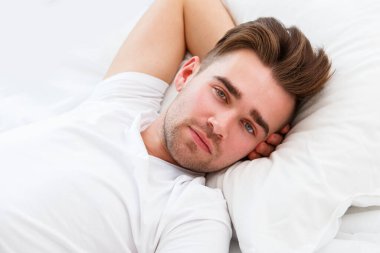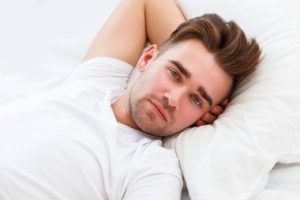
Why Cant I Sleep After Exercise In The Morning (4 Helpful Factors)
Why can’t I sleep after exercise in the morning? Rising with the sun and starting your day with a vigorous workout seems like the perfect recipe for a productive and energized day. Yet, when night falls, you find yourself wide awake, tossing and turning, wondering why sleep remains elusive. The paradox of post-exercise insomnia is a baffling phenomenon that many fitness enthusiasts face.
Despite the common belief that physical exertion should naturally lead to restful slumber, the interplay between your body’s physiological responses, hormone levels, and nervous system activity can sometimes disrupt your sleep patterns. Delving into the reasons behind this conundrum reveals a fascinating intersection of science and human biology, where the very activities meant to promote health and well-being can inadvertently sabotage your quest for a peaceful night’s rest. Let’s explore why your morning exercise routine might be keeping you up at night and how you can tweak your habits to reclaim your sleep.

Why Cant I Sleep After Exercise In The Morning
After exercising in the morning, you might find it difficult to sleep due to heightened adrenaline levels, increased body temperature, and the stimulating effects of endorphins. These physiological changes can interfere with your ability to relax and fall asleep. Additionally, exposure to bright daylight and the mental alertness triggered by exercise can further hinder sleep.
Impact of Adrenaline and Endorphins
Morning exercise boosts adrenaline, which increases heart rate and blood flow, making you feel more alert and energetic. This heightened state can last for several hours, making it challenging to unwind and fall asleep. The endorphins released during physical activity also contribute to a feeling of euphoria, often described as a “runner’s high,” which can keep your mind active and prevent sleep.
Effect of Increased Body Temperature
Physical activity raises your core body temperature, a process that takes time to reverse. Sleep is facilitated by a drop in body temperature, so an elevated temperature can delay the onset of sleep. Even if you feel physically tired after a workout, your body might still be too warm for optimal sleep conditions.
Daylight and Mental Alertness
Exercising in the morning exposes you to bright daylight, which helps regulate your circadian rhythm and makes you feel more awake. Light exposure suppresses melatonin, the sleep hormone, thereby increasing alertness. Moreover, engaging in physical activity stimulates your brain, enhancing cognitive functions and focus, which can make it harder to transition into sleep mode.
Tips to Improve Post-Exercise Sleep
To improve sleep after morning exercise, try to cool down effectively after your workout. This can include stretching, hydration, and perhaps a cool shower to help lower body temperature. Creating a calming post-exercise routine, such as practicing mindfulness or deep breathing exercises, can also help signal your body to relax. Limiting exposure to bright light and using blackout curtains may aid in creating a conducive environment for sleep.
Physiological and Biological Factors
Hormonal Responses to Exercise
Cortisol Levels
Explanation of Cortisol as a Stress Hormone
Cortisol, often dubbed the “stress hormone,” is produced by the adrenal glands in response to stress and low blood-glucose concentration. It plays a vital role in the body’s fight-or-flight response. During exercise, cortisol levels increase to help manage the body’s energy supply. This hormone aids in metabolism regulation, immune response suppression, and blood pressure control.
Effects of Increased Cortisol from Exercise on Alertness and Wakefulness
Elevated cortisol from exercise enhances alertness and wakefulness. Many people experience a boost in energy and mental clarity after a workout due to this hormonal spike. This heightened state of alertness helps in better focus and performance, both mentally and physically.
Discussion on How Elevated Cortisol Can Persist for Hours Post-Exercise
Post-exercise, cortisol levels can remain elevated for several hours. This prolonged presence supports recovery by maintaining glucose levels and reducing inflammation. However, chronically high cortisol from overtraining can lead to fatigue and impaired recovery.
Adrenaline and Norepinephrine
Role of Adrenaline and Norepinephrine in the Body’s Fight-or-Flight Response
Adrenaline (epinephrine) and norepinephrine are crucial in the body’s fight-or-flight response. These hormones prepare the body to face a threat by increasing heart rate, blood flow to muscles, and oxygen intake. They are released rapidly during exercise, prompting swift physiological changes.
Impact of These Hormones on Heart Rate and Arousal
Adrenaline and norepinephrine significantly impact heart rate and arousal. They cause the heart to beat faster, enhancing blood circulation and oxygen delivery to muscles. This leads to heightened physical performance and increased alertness.
Body Temperature Regulation
Exercise-Induced Increase in Core Temperature
How Exercise Raises Body Temperature
Exercise-induced increase in core temperature is a common phenomenon. During physical activity, muscles generate heat, causing body temperature to rise. This process, called thermogenesis, is essential for maintaining metabolic reactions. As your muscles contract, they require more energy, resulting in increased heat production. To dissipate this excess heat, your body activates mechanisms like sweating and increased blood flow to the skin. Understanding how exercise raises body temperature can help optimize workouts and prevent overheating.
Correlation Between Body Temperature and Sleep Onset Latency
There is a strong correlation between body temperature and sleep onset latency. Studies show that elevated core body temperature can delay sleep onset. After exercise, your body takes time to cool down, impacting how quickly you fall asleep. Ensuring you finish workouts a few hours before bedtime can help regulate sleep patterns. Recognizing the link between body temperature and sleep onset latency is crucial for athletes and fitness enthusiasts looking to improve sleep quality.
Time Required for Body Temperature to Return to Baseline Post-Exercise
The time required for body temperature to return to baseline post-exercise varies. Typically, it can take anywhere from 30 minutes to 2 hours, depending on the intensity and duration of the workout. Hydration, ambient temperature, and individual fitness levels also play a role. Cooling down with stretching exercises and staying hydrated can expedite this process. Understanding this timeframe helps in planning exercise routines, especially if aiming for optimal sleep.

Circadian Rhythm and Timing of Exercise
Body’s Internal Clock
Overview of Circadian Rhythm and Its Role in Regulating Sleep-Wake Cycles
The circadian rhythm is the body’s internal clock, a natural, roughly 24-hour cycle that regulates sleep-wake patterns. It synchronizes physiological processes, including hormone release, body temperature, and metabolism, to the external environment. This rhythm is essential for maintaining overall health and well-being. Disruptions can lead to sleep disorders, metabolic issues, and mental health challenges. Understanding your circadian rhythm helps optimize sleep, alertness, and performance throughout the day.
Influence of Morning Exercise on Circadian Rhythms
Morning exercise can positively influence circadian rhythms. Engaging in physical activity early in the day helps reinforce the body’s internal clock, promoting alertness and energy. This practice can also enhance the synchronization of circadian rhythms, leading to improved sleep quality at night. Morning workouts are linked to better mood, increased productivity, and a stronger alignment with natural biological processes. Regular morning exercise routines can therefore play a pivotal role in maintaining a healthy circadian rhythm.
Light Exposure
Interaction Between Exercise, Light Exposure, and Melatonin Production
Light exposure, particularly from the sun, interacts with exercise to influence melatonin production. Melatonin, the hormone responsible for regulating sleep, is suppressed by daylight and increases in the dark. Exercising outdoors in natural light helps reset the circadian rhythm by reducing melatonin during the day, enhancing alertness. Conversely, indoor exercise might not have the same effect. Understanding this interaction can help optimize both exercise routines and sleep patterns for better health outcomes.
How Morning Light Exposure During Exercise Might Impact Evening Melatonin Release
Morning light exposure during exercise significantly impacts evening melatonin release. Early exposure to daylight, combined with physical activity, boosts serotonin levels and delays melatonin onset, resulting in better alignment of the circadian rhythm. This practice can lead to earlier and more restful sleep. It aligns the body’s internal clock with natural light-dark cycles, enhancing overall sleep quality. Integrating morning light exposure with exercise is a powerful strategy to optimize melatonin production and improve sleep health.

Psychological and Behavioral Factors
Mental Stimulation and Alertness
Mental Engagement During Exercise
Cognitive Demands of Exercise Routines
Exercise is not just a physical activity; it also engages the brain. When performing complex routines, individuals need to focus on coordination, balance, and precision. Activities like yoga, Pilates, and martial arts require a high level of cognitive engagement. This mental challenge stimulates the brain, improving neural connections and cognitive function.
Mental Alertness and Its Persistence Throughout the Day Post-Exercise
Engaging in physical activity has a profound impact on mental alertness. After a workout, people often report feeling more awake, focused, and ready to tackle the day. This heightened state of alertness can persist for hours, enhancing productivity and concentration. Regular exercise boosts the release of endorphins and other neurotransmitters that improve mood and mental clarity.
Psychological Arousal
Discussion on the Stimulation of Mental State and Alertness
Psychological arousal refers to the heightened state of sensory and cognitive alertness. This state is often achieved through various stimuli, including exercise. When the body is active, the brain is stimulated, increasing awareness and responsiveness. This mental state is crucial for tasks that require focus and quick decision-making.
Effects of High-Intensity Workouts on Mental Arousal Levels
High-intensity workouts, such as interval training or spinning classes, significantly elevate mental arousal levels. These intense exercises increase heart rate and blood flow, delivering more oxygen to the brain. As a result, individuals often experience a surge in energy and mental sharpness post-exercise.
Stress and Anxiety
Exercise as a Stressor
Exercise, especially high-intensity workouts, can act as a physical stressor on the body, triggering the release of stress hormones like cortisol. This can initially elevate heart rate and blood pressure, contributing to the sensation of stress. However, regular exercise is also known to reduce overall levels of stress and anxiety over time. Interestingly, there’s a complex relationship between exercise, stress, anxiety, and sleep quality. While moderate exercise can promote better sleep by regulating circadian rhythms, intense workouts close to bedtime might lead to difficulty falling asleep due to elevated arousal levels.
Overthinking and Rumination
The impact of exercise on mood and mental state is profound. While it can alleviate stress and anxiety for many, some individuals experience heightened anxiety post-exercise. This can be attributed to the release of adrenaline and cortisol during workouts, which can linger afterward. This lingering anxiety may manifest as overthinking and rumination, particularly at night when the mind tends to wander.

Behavioral Patterns
Daily Routine and Activity Levels
Analysis of how a busy post-exercise schedule might impact rest and relaxation
Balancing a jam-packed schedule with vigorous exercise can leave little time for restorative downtime. The demands of a bustling day, compounded by intense physical activity, may hinder the body’s ability to unwind. Striking equilibrium between exertion and relaxation becomes crucial in maintaining overall well-being.
Influence of productivity and active lifestyle on sleep readiness
A highly productive day fueled by an active lifestyle can positively influence sleep readiness. Engaging in regular physical activity enhances the body’s readiness to embrace rest, fostering deeper and more restful sleep. This symbiotic relationship between productivity, activity levels, and sleep readiness underscores the importance of holistic self-care practices.
Sleep Hygiene
Importance of a consistent sleep routine
Maintaining a consistent sleep routine is paramount for optimal rest. Establishing regular sleep-wake cycles helps synchronize the body’s internal clock, promoting better sleep quality and overall well-being. Consistency in bedtime and wake-up times is key to nurturing healthy sleep hygiene habits.
How morning exercise might disrupt pre-existing sleep hygiene practices
Incorporating morning exercise into one’s routine can disrupt pre-existing sleep hygiene practices. While physical activity is beneficial for overall health, rigorous morning workouts may inadvertently shift sleep schedules or disrupt established bedtime routines. Striking a balance between morning exercise and maintaining consistent sleep habits is essential for achieving optimal restorative rest.
Practical Considerations and Solutions
Adjusting Exercise Intensity and Duration
Low vs. High Intensity
Understanding the Impact on Sleep and the Body Exploring how exercise intensity affects sleep quality and overall well-being. Low-intensity workouts are gentler on the body, promoting relaxation conducive to better sleep. Conversely, high-intensity exercises can increase cortisol levels, potentially disrupting sleep patterns. A Solution for Sleep-Friendly Exercise Routines Recommendations for morning workouts that strike a balance between intensity and timing. Opt for moderate exercises in the morning to avoid overstimulation before bedtime. Incorporating activities like yoga or brisk walks can energize without interfering with sleep later on.
Duration of Exercise
Finding the Sweet Spot Delving into the ideal length of workouts for maximum benefits. Aim for 30 to 60 minutes of exercise per session to optimize physical and mental health. Longer durations may lead to diminishing returns and heightened fatigue, affecting sleep quality. Balancing Exercise Duration for Improved Well-being Emphasizing the importance of balancing exercise duration to prevent exhaustion and sleep disturbances. Avoid prolonged workouts that may strain the body and disrupt sleep patterns. Instead, prioritize consistency and quality over excessive duration to maintain optimal health.
Cooling Down and Recovery
Importance of a Proper Cool-Down Routine
After a workout, a proper cool-down routine is vital for aiding in muscle recovery and preventing injury. Cooling down effectively involves gradually decreasing heart rate and easing muscle tension. Stretching, yoga, and relaxation exercises play a crucial role in this process, promoting flexibility and reducing post-exercise soreness.
Techniques for Cooling Down Effectively Post-Exercise
Effective cooling down techniques include gentle aerobic exercises like walking or slow jogging, which help gradually lower heart rate. Incorporating static stretches targeting major muscle groups aids in reducing muscle tightness and improving flexibility. Additionally, deep breathing exercises and meditation can help relax the mind and body, promoting a sense of calmness and well-being.
Post-Exercise Recovery
To aid in physical recovery after exercise, various strategies can be employed. Cold showers or ice baths help reduce inflammation and soothe sore muscles, promoting faster recovery. Adequate hydration is crucial for replenishing lost fluids and maintaining optimal bodily functions. Proper nutrition, including a balance of carbohydrates and protein, supports muscle repair and growth, enhancing overall recovery.
Strategies for Aiding Physical Recovery
Incorporating cold showers into post-exercise routines can expedite muscle recovery by constricting blood vessels and reducing inflammation. Hydration is key, as replenishing lost fluids helps prevent dehydration and supports optimal muscle function. Consuming nutrient-rich foods, such as lean proteins and complex carbohydrates, provides essential building blocks for muscle repair and replenishment. These recovery strategies are essential for maintaining peak performance and preventing injury.
Managing Hormonal and Temperature Effects
Timing of Meals and Hydration
Importance of Post-Exercise Nutrition and Hydration
Proper post-exercise nutrition replenishes lost nutrients and aids in muscle recovery. Hydration post-workout is vital to restore fluid balance and prevent dehydration. Timing meals after exercise within the first hour is crucial for optimal recovery. Balanced meals containing protein and carbohydrates aid in muscle repair and glycogen replenishment.
How to Time Meals to Avoid Sleep Interference
Avoid heavy meals close to bedtime to prevent digestive discomfort. Opt for lighter, easily digestible snacks if eating late after exercise. Spacing dinner at least two hours before bedtime can aid in better sleep quality. Choose foods rich in tryptophan, like turkey or dairy, to promote sleepiness.
Regulating Body Temperature
Techniques to Cool Down Body Temperature Post-Exercise
Engage in low-intensity exercise post-workout to gradually decrease body temperature. Take a cool shower or bath to help lower core body temperature. Utilize relaxation techniques like deep breathing to promote cooling down. Apply cold towels or immerse in a cool water bath to accelerate temperature reduction.
Use of Cooling Techniques Like Ice Packs, Cooling Vests, and Environmental Adjustments
Apply ice packs to pulse points like the neck, wrists, and temples to quickly cool the body. Wear cooling vests or clothing with moisture-wicking properties during exercise. Adjust environmental factors like room temperature and airflow to facilitate cooling. Incorporate fans or air conditioning to enhance cooling effects after workouts.
Enhancing Sleep Hygiene
Establishing a Relaxing Evening Routine
Creating a serene pre-sleep ritual is essential for enhancing sleep hygiene. Engage in calming activities like reading, meditation, or gentle stretching. Diminish screen time to mitigate the impact of blue light on your sleep cycle. By winding down gradually, you signal to your body that it’s time to rest.
Creating a Sleep-Conducive Environment
Crafting a comfortable sleep space is pivotal for quality rest. Optimal bedroom temperature, typically between 60-67°F (15-19°C), fosters sleep. Ensure minimal lighting, using blackout curtains or sleep masks to block out excess light. Keep noise levels low or utilize white noise machines to drown out disturbances, promoting uninterrupted sleep. Prioritizing these environmental factors cultivates an ideal setting for restorative rest.
Frequently Asked Questions (FAQ) About Why Cant I Sleep After Exercise In The Morning
Q1. Why do I have trouble sleeping after exercising in the morning?
A. Morning exercise can increase your body temperature and stimulate the release of hormones like adrenaline and cortisol. These factors can make it harder for your body to relax and fall asleep later in the day.
Q2. How does exercise affect my body’s internal clock?
A. Exercise can influence your circadian rhythm, the body’s internal clock that regulates sleep-wake cycles. Morning workouts might shift your circadian rhythm, making you more alert and delaying your desire to sleep.
Q3. Can the intensity of my morning workout impact my ability to sleep?
A. Yes, high-intensity workouts can lead to prolonged elevated heart rate and adrenaline levels, which may interfere with your ability to wind down and sleep, even hours after your exercise session.
Q4. Does hydration after exercise play a role in sleep difficulties?
A. Proper hydration is crucial, but overhydration close to bedtime can lead to frequent trips to the bathroom, disrupting sleep. Finding the right balance is key.
Q5. Are there specific types of exercises that are more likely to disrupt sleep?
A. Vigorous activities like running or high-intensity interval training (HIIT) are more likely to cause sleep disturbances compared to moderate activities like yoga or walking.
Q6. Could my post-exercise nutrition be affecting my sleep?
A. Consuming caffeine or high-sugar foods after exercising can increase alertness and energy levels, making it harder to fall asleep. Opt for balanced meals with protein and complex carbohydrates instead.
Q7. How long should I wait to nap after morning exercise?
A. It’s best to wait at least an hour after exercising to nap, giving your body time to cool down and your heart rate to normalize. However, avoid napping too close to your regular bedtime to ensure it doesn’t affect your nighttime sleep.
Q8. What strategies can help me sleep better after morning exercise?
A. Cool Down Properly: Ensure a proper cool-down period after your workout.
Mind Your Diet: Avoid caffeine and sugary foods post-exercise.
Hydrate Wisely: Drink water but avoid excessive fluids close to sleep.
Relaxation Techniques: Practice relaxation techniques like deep breathing or meditation to help calm your mind and body.
Q9. Is it better to exercise at a different time if I have trouble sleeping?
A. If morning exercise consistently affects your sleep, consider experimenting with exercising at different times of the day, such as late afternoon or early evening, to see if it improves your sleep quality.
Q10. Should I be concerned if I can’t sleep after morning workouts?
A. Occasional sleep disturbances are common, but if you regularly struggle to sleep after morning exercise, it might be worth adjusting your routine or consulting with a healthcare professional to explore other potential underlying causes.
Conclusion
In conclusion, the inability to sleep after morning exercise can be attributed to several physiological and psychological factors. The primary reason is that physical activity elevates body temperature and stimulates the release of adrenaline and endorphins, which can increase alertness and energy levels, making it harder to wind down.
Additionally, the shift in circadian rhythms caused by morning workouts can disrupt the body’s natural sleep-wake cycle. It’s also possible that exercise-induced stress or dehydration may play a role in hindering post-exercise sleep. To mitigate these effects, it is advisable to incorporate cool-down routines, ensure adequate hydration, and allow sufficient time between exercise and rest to enable the body to return to a state conducive to sleep. By understanding and addressing these factors, one can better manage post-exercise sleep disturbances and enjoy the benefits of both physical activity and restful sleep.